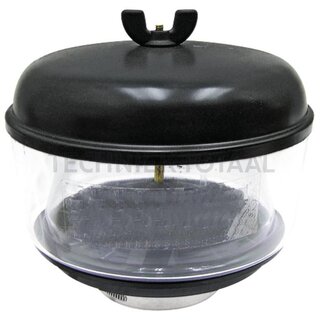Cyclone Filters: Powerful Filtration for Optimal Performance
Cyclone filters are essential components in many machines and systems operating in dusty or polluted environments. Whether you work in agriculture, construction, or industry, cyclone filters efficiently separate dust and dirt particles from the air, ensuring your machine remains in optimal condition. These filters use centrifugal force to remove particles from the air, providing a clean airflow and enhancing the performance of your motor or machine.
Using cyclone filters not only prevents wear and clogs in the system but also extends the lifespan of your equipment. They are ideal for environments with high levels of dust, dirt, or debris and are often a critical part of the air filtration system in vehicles and machinery.
What Are Cyclone Filters?
Cyclone filters are a type of air filter that uses centrifugal forces to remove particles from the airflow. Instead of simply passing air through a filter material, the air spins around inside the filter housing, pushing heavier dust particles to the outer edges. These particles then fall to the bottom of the filter, while clean air continues to flow to the engine or another part of the system.
This method of filtration is highly efficient at removing larger particles, allowing the filter itself to remain unclogged and last longer. Cyclone filters are often used in combination with other filtration systems to achieve even better air quality.
Tips for Using Cyclone Filters
-
Regular Inspection and Cleaning: While cyclone filters require less maintenance than traditional filters, it’s important to check them regularly. Dust and debris collect in the dustbin, so make sure to empty it in a timely manner to maintain optimal performance.
-
Choose the Right Filter Size: Cyclone filters come in various sizes and capacities. Ensure you select a filter that suits the size of your machine and the working conditions. A filter that is too small may be less effective, while one that is too large could take up unnecessary space.
-
Combine with Other Filters: While cyclone filters are very effective at removing larger particles, they work best when paired with other fine-particle filters. This ensures a complete filtration system that removes even the smallest particles from the air.
-
Long-Term Maintenance: Cyclone filters generally have a longer lifespan than traditional filters but still need to be replaced periodically to maintain their efficiency. Follow the manufacturer’s recommendations for filter replacement intervals.
Benefits of Cyclone Filters
Efficient Dust Removal
The primary advantage of cyclone filters is their ability to remove large amounts of dust and dirt particles from the air. This makes them ideal for use in dusty environments like construction sites, farms, or workshops with sawdust or other debris in the air.
Reduced Maintenance
Unlike traditional filters, which need frequent replacement when clogged, cyclone filters require less maintenance. They fill up less quickly because most dust particles are separated and collected in a dustbin. This means less downtime for replacing filters and more uptime for your machine.
Improved Machine Performance
By ensuring clean air, cyclone filters allow the engine or system they’re used in to operate more efficiently. Clean air means less wear on the internal components of the engine and prevents your machine from overheating or underperforming due to dirty air.
Durable and Cost-Effective
Cyclone filters last longer than many other filters, meaning you’ll need to purchase replacements less frequently. This makes them a cost-effective solution for those working regularly in dusty and dirty environments. The durability of these filters also contributes to lower long-term maintenance costs.
Frequently Asked Questions About Cyclone Filters
1. How often should I clean my cyclone filter?
This depends on the environment you work in and the amount of dust your machine is exposed to. In very dusty environments, it may be necessary to check the filter weekly and empty the dustbin. In less extreme conditions, a monthly check may suffice.
2. Can cyclone filters remove small particles?
Cyclone filters are particularly effective at removing larger dust particles. For smaller, finer particles, it’s best to combine a cyclone filter with a fine-particle filter. Together, they provide a comprehensive air filtration solution.
3. Are cyclone filters suitable for all types of machines?
Cyclone filters are commonly used in heavy machinery such as tractors, excavators, and other vehicles that operate in dusty environments. However, they may not always be the best choice for smaller vehicles or machines used in less polluted environments. Always consult your machine’s specifications to determine which filter type is most suitable.
4. Do I need to replace or just clean my cyclone filter?
Cyclone filters can often be used for extended periods without full replacement. Regular cleaning and emptying of the dustbin are sufficient to keep the filter effective. However, over time, wear and tear can occur, and replacement will be necessary. Refer to the manufacturer’s guidelines for specific maintenance recommendations.








